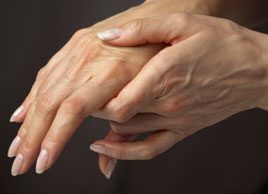Homemade arthritis remedies: The truth about what works
Treat your arthritis pain effectively by ensuring the treatment you’re trying actually works. Find out which homemade arthritis remedies actually work, and which ones are too good to be true

Source: Photo credit: © iStockphoto
What do hot peppers, green tea and gin-soaked raisins have in common? They’re all natural remedies for the pain and swelling of arthritis‘ at least, that’s what many people would swear to if you asked them.
Arthritis is common, affecting one in six Canadians. They’re not all seniors, either: Sixty percent of people with arthritis are under the age of 65. For those dealing daily with this disease, it can be a challenge to find relief. That’s why they turn to a try-anything approach.
‘The most prevalent symptom of arthritis, the thing that shows up first and is the most aggravating, is pain,’ says Dr. David Hart, professor of medicine at the University of Calgary and scientific director of The Arthritis Society. When it comes to experimenting with home remedies, he says, folks are often open-minded. ‘People think, if it helps me, great, and if it doesn’t, fine.’
The trouble with many of these treatments, though, is that while there may be convincing testimonials out there’celebrity athlete wears ionized metal bracelet and claims his arthritis pain disappears’there isn’t always the science to back them up. And sometimes just believing something will help you is enough to convince you it’s making a difference. ‘It’s not that the disease gets better, it’s that the symptoms decrease. The placebo effect can affect pain perception,’ Dr. Hart says. (In the case of the ionized bracelet, a Mayo Clinic study discredited any effect it has on arthritis pain.)
One treatment doesn’t fit all
Another challenge is that everyone’s disease is different. What works for some people may have absolutely no effect on others. Injections of hyaluronic acid, a lubricant, have been shown in a recent Swiss study to cause uncomfortable side effects without offering much help. Yet there’s a small number of people whose arthritis temporarily improves after the injections.
The same for glucosamine with chondroitin sulfate, as research funded by the U.S. National Institutes for Health has demonstrated. While this supplement combo didn’t help most people with osteoarthritis, there was significant pain relief in a subgroup. ‘We’re so heterogeneous, it makes it hard to do a study,’ says Dr. Hart.
Science can and does show promise for certain remedies, like the omega-3 fatty acids found in fish oils. The University of Dundee in Scotland reported that people with rheumatoid arthritis who took a daily cod liver oil supplement instead of a placebo were able to reduce their anti-inflammatory medications. But Dr. Hart points out that subjects in a study like this would probably realize they’re taking cod liver oil (‘Your skin, your sweat smells like fish oil’). So it’s difficult to do a true double-blind study, in which neither the test subjects nor the researchers initially know who’s getting a placebo.
Even when a supplement truly works, that’s no guarantee that the capsules you buy at your local health store have been produced with the strength required to have an effect. ‘In many cases, there’s no standardization as to the potency of a particular concoction. The formulation can vary from one supplier to the next,’ Dr. Hart says. While there is evidence that capsaicin cream (with hot pepper extract) may provide a limited amount of relief from arthritis pain, for instance, products differ in their concentration of the substance.
But you can probably put on the kettle with confidence. Several encouraging studies show links between green tea and a reduction in the inflammation of rheumatoid arthritis. But raisins soaked in gin? There’s only weak evidence that juniper (used in gin) may have an anti-inflammatory effect. So there isn’t enough strong science yet to send you to the liquor store.
Help to ease symptoms
How about other non-pharmaceutical remedies? It’s proven that weight loss will help with arthritis symptoms. ‘For every 10 pounds that you weigh, it puts another 40 pounds of loading on your knee,’ says Dr. Hart. ‘Some people on waiting lists for joint replacements can go home, lose 40 pounds and their knees won’t hurt anymore.’ Plus activities that improve your sleep, like yoga and meditation, can help cut your chronic pain.
‘Taking drugs isn’t necessarily the only option out there,’ says Dr. Hart. ‘But you may have to do a variety of things. It’s not like there’s one magic bullet out there. You want to be in a position to do what’s best for you.’
Don’t miss out! Sign up for our free weekly newsletters and get nutritious recipes, healthy weight-loss tips, easy ways to stay in shape and all the health news you need, delivered straight to your inbox.




